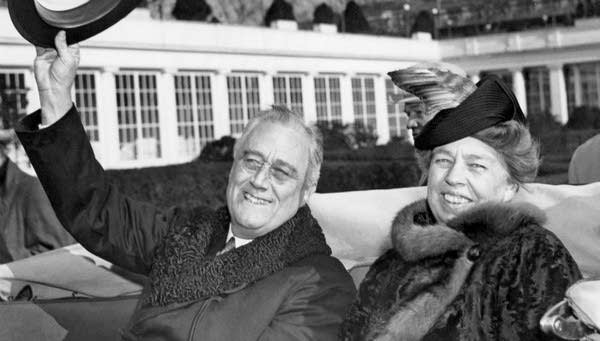The Roosevelts as a political team
Eleanor and Franklin Roosevelt were not the first White House couple to act as political partners, but they were the first to do so in such a public fashion.

Eleanor and Franklin Roosevelt were not the first White House couple to act as political partners, but they were the first to do so in such a public fashion. Eleanor Roosevelt was a first lady of firsts. She was the first president’s wife to fly in an airplane. She was the first to testify before Congress. She was the first to hold a government job and to address a national political convention. FDR supported her public activities, in part, because they benefited his own political ends.
Eleanor Roosevelt’s public appearances, newspaper columns and radio broadcasts were not managed by the FDR’s advisers. But ER knew what her husband’s goals were, and many of her public statements helped move the president’s agenda forward. ER also sometimes nudged his policies in directions she cared about. Some of FDR’s advisers, who were mostly men, wished for a first lady who was more of a conventional White House hostess. But FDR himself supported his wife’s work.
“In all the years we were in the White House, he never asked me not to do anything,” ER told an interviewer after FDR’s death. “But I remember once sending him a column because I thought I touched on something controversial the he might think was harmful. And I got it back with one word changed. And a simple little note: ‘This word seems to me less antagonistic.'”
Still, in 1936, the New Yorker reported that FDR either instructed or asked ER to decline a series of 13 commercial broadcasts. “He has put his foot down several other times, too,” the article said. “We don’t know what the objections have been.” It was an election year, and ER kept a markedly low radio profile. She did no commercial broadcasting in 1936, and made far fewer unpaid radio appearances than in other years.
Most of the time, however, ER had free rein to say what was on her mind. Historian Blanche Wiesen Cook writes that FDR encouraged the first lady to engage in the public debate on issues. “She served as a sounding board and a front runner,” Cook writes. “He knew he could restrain her, but he rarely tried.” Cook says FDR seldom acknowledged ER’s influence, but that Eleanor did have the president’s ear. She undertook fact-finding missions around the country – and even to wartime Great Britain — and reported back to him on what she found. When she was home, they might talk politics over the dinner table. ER said that vigorous arguments were not uncommon. Eleanor’s idealism sometimes clashed with Franklin’s political pragmatism.
In later interviews, Eleanor Roosevelt downplayed her influence on FDR. “I don’t think that the wife of a president should ever forget that it is he who is doing the important job,” she said. “And whatever she does must be of help to that job.” But politicians and activists of the time knew better. They would often approach Eleanor with proposals or objections she might agree with and pass on to her husband.

FDR speechwriter Samuel Rosenman said ER would often read drafts of the president’s speeches, and was “very helpful” on scripts related to youth, education or consumer interests. And ER regularly left FDR a basket of reading to take to bed with him, letters and newspaper clippings she thought he should see.
FDR’s radio appearances were more carefully scripted than ER’s. He had Pulitzer Prize winner Robert Sherwood helping him craft his Fireside Chats; she wrote all of her own material and gave live interviews. Radio historian Jason Loviglio contends that FDR’s radio speeches tended to emphasize national unity, while ER’s radio talks emphasized diversity and respect for social, cultural and gender differences. Her writings, speeches and broadcasts often dealt with homey topics rather than politics, such as whether chaperones were going out of style, or a mother’s responsibility as a citizen. But she also took on controversial subjects.
ER has been widely described as the conscience of the Roosevelt administration. She often staked out progressive-left positions on controversial issues where FDR felt politically constrained. Her public position on civil rights, for example, was to the left of her husband’s. He had to retain the support of southern Democrats, but she was able to be outspoken in her advocacy for equal treatment for people of color.
ER’s passionate belief in civil rights led to conflict with her husband after the United States’ entrance into World War II, when FDR decided to imprison Japanese-American citizens in internment camps. ER opposed this idea, but when it became administration policy, she supported it publicly. After FDR’s death, Eleanor Roosevelt said internment had been a mistake.
Throughout their partnership, though, Franklin and Eleanor respected and relied on each other’s judgment. They shared many of the same progressive, democratic ideals and worked alongside one another to bring about their visions of what the United States should be.

